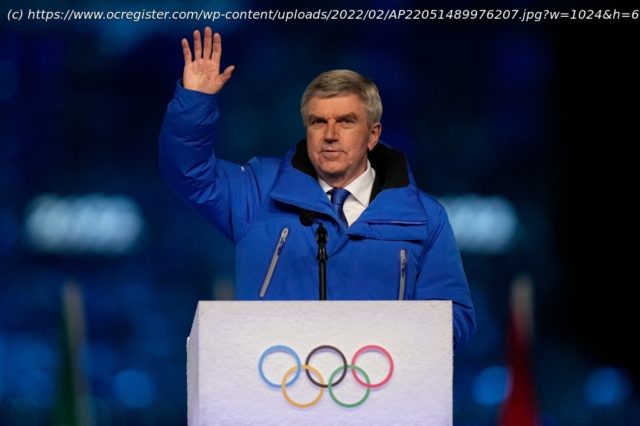As the games close, the most memorable moment was the meltdown at the conclusion of women’s figure skating. It may forever damage the Olympic movement.
International Olympic Committee president Thomas Bach, a former Olympic fencing champion, likes to wield what he describes as the power of the Games like it’s Excalibur. In closing the Beijing Olympics at National Stadium Sunday, Bach again pulled his rhetorical sword out its sheath. “This unifying power of the Olympic Games is stronger than the forces that want to divide us: you give peace a chance,” Bach said in his closing address. “May the political leaders around the world be inspired by your example of solidarity and peace.” As Bach spoke China, the Games’ host nation was, according to several human rights groups, committing atrocities against an ethnic minority group and suppressing political dissent in Hong Kong, while Russia was amassing troops on its border with Ukraine. Bach made a final reference to the Beijing Games, “this unforgettable Olympic experience,” and then the flame was extinguished. A larger fire could prove much harder for Bach and the IOC to put out. Games that opened with the IOC widely accused of being complicit in China’s human rights abuses ended with the organization in the midst of a firestorm of controversy surrounding the latest Russian doping scandal that has seriously if not irreparably undermined the credibility of the Olympic Games, according to Olympians, past and present, international sports officials and athletes rights advocates. “I think people don’t believe what they see,” said Rob Koehler, former deputy general of the World Anti-Doping Agency. “I think they’re bewildered and I think they’re losing interest and they no longer see the Olympics the way they used to be. They’re seeing the power and the corruption and the purity is lost. And (the IOC member) have themselves to blame for that. I think the numbers speak for themselves for these Games when it comes to viewership. People are losing interest.” Even before the controversy surrounding the Court of Arbitration for Sport’s decision to clear Russian figure skater Kamila Valieva, the 15-year-old gold medal favorite, to compete in the women’s competition despite testing positive for a banned endurance-boosting drug, swallowed the Games, the ratings for NBC’s Olympic coverage were at an all-time low. Those ratings continued to slide through the second week of Games, that despite displays of athletic brilliance and moments of courage and poignancy, were unable to escape the shadow of the Russian doping scandal. Norway cross country skier Therese Johaug won the 30,000 meter mass start race Sunday for her third gold medal of the Games, the country’s record 16th gold as it continued its Winter Olympics dominance. Nathan Chen skating to Elton John and Bernie Taupin’s “Rocket Man” took flight with an almost flawless free skate for an Olympic record-setting victory. Chloe Kim also soared, defending her halfpipe against a skyline of nuclear reactors. U.S. skier Mikaela Shiffrin went home medal-less but would draw wide praise for her gracious and frank handling of a series of disappointments. The Olympic landscape was marked by fences, barbed wire and workers in hazmat suits. China’s decision to shut off athletes, officials and the media from the rest of country in a so-called closed Olympic loop resulted in a 0.01 percent positive test rate. But China’s measures also drew criticism from athletes and officials. The closed loop, said Canadian snowboarder Mark McMorris was “like a sports prison.” But above all, the Beijing Games will be best remembered and symbolized by three haunting images from the women’s free skate Tuesday: Valieva being scolded and bullied by her coach Eteri Tutberidze before a global television audience after a mistake-filled meltdown of a program dropped the skater from first to fourth; Anna Shcherbakova, the new 17-year-old Olympic champion and a training partner of Valieva, not celebrating her victory but standing alone in a waiting area just off the Capital Indoor Stadium ice, looking sad and bewildered, and Alexandra Trusova, the silver medalist and another Tutberidze-coached skater, initially refusing to take part in the award ceremony.
Home
United States
USA — mix ‘People Don’t Believe What They See’ – Olympic Games’ credibility damaged by...






